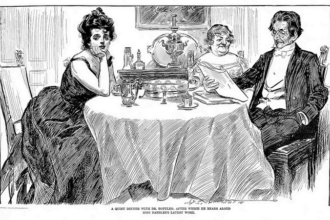Paths to Caring?
Ebola is a harrowing disaster in West Africa, killing thousands and leaving devastated families in its wake. Ebola is a surreal debacle in America. Leaving outraged politicians and spluttering bureaucrats sweating in front of TV cameras. No one should be surprised. Ebola followed the same path in each place—the path of indifference and hubris. No one, except Doctors Without Borders, cared enough. In Africa, Atlanta or Dallas.
Paths to Caring?
Ebola is a harrowing disaster in West Africa, killing thousands and leaving devastated families in its wake. Ebola is a surreal debacle in America. Leaving outraged politicians and spluttering bureaucrats sweating in front of TV cameras. No one should be surprised. Ebola followed the same path in each place—the path of indifference and hubris. No one, except Doctors Without Borders, cared enough. In Africa, Atlanta or Dallas.
Lights Out
The dogs had been barking at a mystery intruder. They’d stare out the glass-paned door, focused on a spot just beyond the front porch, then bark frantically for a minute or so. I’d dash to the front hall, hoping to see the critter. No luck.
Working in the garden one quiet morning, I caught a fleeting movement a few feet away. Standing motionless, I watched a weasel dart from beneath the deck. It saw me and disappeared in a fluid blur. A half minute ticked over. A face peered out, withdrew. Again.
Each appearance was a second or two longer. Weasels (Mustela erminea) are tiny and quicksilver-fast. This one flashed in and out of its hiding place, running like a continuous film loop, until it decided I wasn’t a threat. It came out, sat on its haunches about five feet away, yawned and stretched. The spell was broken when the dogs wandered by the door, saw the weasel and exploded in frenzied barking.
The weasel vanished.
Mystery solved.
The low-voltage garden lights went dark a few days later. The problem traced to a loose connection in the weasel’s path under the deck. The splice was twenty years old or more. The copper wire was exposed and corroded, the black electrical tape tattered. No way to be sure, but it’s possible that weasel traffic loosened the old connections enough to douse the lights.
Splices
I pulled out my garden light tool kit and set to work repairing the break. Wire stripper, spare cable, electric tape, old bandage scissors. I wire stripped and spliced, casually thinking over the day’s news. Ebola and its irony-laden arrival. And about Nina Pham and Amber Vinson, fellow nurses. First Americans to contract Ebola on US soil. I remembered a New York Times op-ed piece about poverty and the risk of tropical diseases in Texas. I’d read it a few years ago. It was unforgettable.
The piece was by Peter J. Hotez, MD, Dean of the National School of Tropical Medicine at Baylor College of Medicine. Dr. Hotez wrote of poverty that plagues much of the Gulf Coast, particularly the destitute counties of southwest Texas. He listed a chilling inventory of infections that most American health care workers never expect to face. But Dr. Hotez, in his darkest nightmares, likely did not dream of Ebola.
The Ebola virus did not make its way to Dallas because of poverty. Dr. Hotez studies tropical illnesses that breed in fetid, flea-ridden, garbage-strewn streets of Gulf Coast Texas. Diseases that have become endemic because Texas finds it acceptable to let 20% of its citizens live in destitution. Worse, in its poorest counties, the poverty rate approaches 30% and people may live on $2 per day or less. The problem is compounded by legions of Texans with no health insurance. Texas has the highest rate of uninsured folks in the country at 22.6%, many of them children.
Hubris, indifference, and inequality gave Ebola a chance in Dallas. The hubris displayed by top-level clinical administrators at the CDC in Atlanta and Texas Presbyterian who figured they knew how to control a vicious virus. Indifference shown by those same people toward staff about whether  workers caring for Ebola patients had adequate training. Whether nurses had protective gear to care safely for the Ebola-stricken. Indifference ingrained as a habit toward the masses of less-fortunate Texans. Including rank-and-file workers.
workers caring for Ebola patients had adequate training. Whether nurses had protective gear to care safely for the Ebola-stricken. Indifference ingrained as a habit toward the masses of less-fortunate Texans. Including rank-and-file workers.
The inequality that allows Texans to ignore uninsured children made it easier to send uninsured Thomas Duncan on his way with a high fever. Indifference and inequality have become habit.
Texas Health Presbyterian Hospital Dallas is one of 25 hospitals in the Texas Health Resources network. Barclay E. Berdan is Texas Health Resources’s CEO. Daniel Varga, MD is its chief clinical officer. He’s also a senior executive vice president whose duties include “quality, patient safety, and patient experience initiatives.” Varga has been the hospital’s public face during the Ebola crisis.
Texas Health Resources is a not-for-profit organization. So it must file Form 990 with the IRS each year. Form 990 is a detailed financial report that all not-for-profit institutions must file with the IRS to justify their tax-free status. These forms must be available for public inspection. A watchdog group called CitizenAudit.org aggregates these forms and makes them publicly available on the web.
Barclay Berdan was promoted from chief operating officer to CEO on September 1, 2014. For tax year 2012, his predecessor made $2.5 million. Probably safe to assume Mr. Berdan isn’t making less. Dr. Varga held each of his current titles in 2012. He pulled down $500,000. (See: http://pdfs.citizenaudit.org/2013_12_EO/75-2702388_990_201212.pdf )
Yeah, sure, Berdan oversees a big outfit. Before anyone grumbles about what he’d be paid in the private sector, think a moment about the chaos his incompetence unleashed. A life lost. Two threatened. Ebola didn’t make it to the C-suite. But the buck does.
Lights On
The fresh splice was finished. Plugged in the circuit. The lights glowed more brightly than before with a clean connection.
Ebola made predictable connections from a Liberian patient to American nurses, too. But no light is shining in Dallas or Atlanta. Perhaps miscommunication, badly designed EHRs and misdiagnosis explain a small part of the events. We may never know. The folks at Texas Presbyterian and the CDC are giving weaselly answers with their mea culpas.
Peter Hotez had the courage to say parts of America look a lot like the developing world. But there’s a bright side. Maybe Doctors Without Borders would consider building a field hospital in Brownsville.








